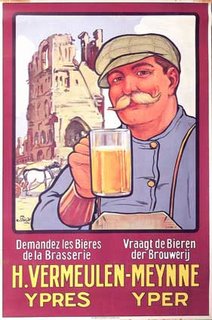 In his autobiographical “The Factory of Facts,” the Belgian-American writer Luc Sante recalls the drab post-WW II industrial reality of his childhood home of Verviers, a city in the Wallonian rustbelt.
In his autobiographical “The Factory of Facts,” the Belgian-American writer Luc Sante recalls the drab post-WW II industrial reality of his childhood home of Verviers, a city in the Wallonian rustbelt.
Reading Sante’s reflections on a society both stratified by factory life and traumatized by its wartime experience, my thoughts turned to lager beer of the German model.
Lager developed in lockstep with the industrial revolution throughout Europe, supplanting traditional beer styles that had origins in the countryside. It finally “conquered” Europe and the planet during the Cold War, taking full advantage of modern distribution and marketing techniques along the way.
More than one sociologist has observed that cigarettes represent the perfect adaptation of design to the necessities of time and space brought about by the industrial revolution, as well as the reduction in prices stemming from mass production. Cigarettes are cheap, effective conveyances of nicotine, and can be consumed while you’re waiting for the bus. Pipes and cigars take more effort – and more time.
Mass-market lager fully parallels cigarettes in this sense. It’s a quick and easy alcohol delivery device, familiar and trusted through saturation advertising techniques pioneered by odious totalitarian regimes, and benefits in the business sense from economy of scale and incessant "market rationalization,” which is geek-speak for “species extinction.”
Belgium has somehow managed to retain a healthy semblance of its diverse brewing heritage in spite of the country’s domestic consumption now favoring bland, mass-produced lagers to the tune of 70-30, and growing with each passing year.
While we can argue over whether the survivors of pre-industrial brewing traditions like farmhouse saisons, lambics, sour reds and Trappist ales are as “good” now as they were before, it is agreed that Belgium remains a country where there is relatively customary proximity to beers that differ from the industrial lager norm.
You can lead a tourist – a native, for that matter – to diversity … but you can’t make him think. For that reason, visitors to Belgium all too often fail to notice the numerous choices available for their enjoyment, exercising instead the world-renowned clueless timidity of the American psyche and subsisting on a beer diet of Stella Artois, Jupiler and Maes Pils – the Budweiser, Miller and Coors of Belgium.
Subsequently they compound this mistake by phoning my pub and asking me to help them find the beer they loved so much while in Belgium. Nine times out of ten, it’s Stella Artois ... and the next sound they hear is “click” as I hang up on them.
The Curmudgeon has considered and dismissed Stella Artois previously in this space (“Stella Artois? I'll pass”), but the bile came bubbling back to the surface recently when a customer gave me the drinks menu from a newly opened establishment in St. Matthews.
I won’t mention the name of the bar because I don’t intend to single them out for embarrassment, and besides, it’s a better than average beer list, with one glaring obscenity: Stella Artois on draft for $5 (presumably, in a 16-oz mixer pint).
That’s a higher price for Stella Artoise than for Guinness, Smithwick’s and Newcastle (all at $4.50), and the same price as Delirium Tremens and Hoegaarden.
I don’t have a problem with “what the market will bear,” especially in trendy areas of Louisville. What annoys me is that although Stella Artois has absolutely nothing to do with Belgian beer as it can and should be, any number of brain-dead revelers will coo over the price point as an affirmation of Belgian beer’s intrinsic goodness.
Don’t kid yourselves. Stella Artois is a formless industrial lager, cheaply made, and mass-produced by a nasty multinational corporation. It's priced twice as high as American beer of the same insipid stripe. There’s nothing Belgian about it. If you care so little about what passes through your lips, you might as well drink another Silver Bullet.
Maybe the owner of the place is trying to be funny. Kind of like when a certain curmudgeon I know charged - what? Eight dollars or so for a bottle of Bud?
ReplyDeleteThe line on the menu clearly stated:
ReplyDeleteIf it truly is the King of Beers, it's worth a King's ransom
No, they're not trying to be funny.
ReplyDeleteI may have been ... but someone actually paid $8 once.
Just once.
I think its funny that my distributors keep promising me this stuff in bottles, and have for the past year.... and I just nod and smile and wonder just where am I going to fit this in my cooler.... maybe I will have to reduce the space of Miller Lite to make it fit... its seems like the correct place for it.
ReplyDelete